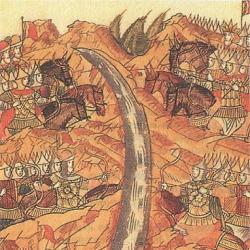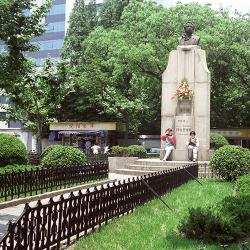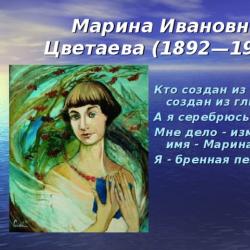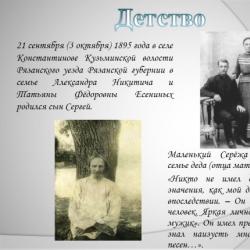An essay based on a work on the topic: “A monument to which the folk path will not be overgrown.” Alexander Pushkin - I erected a monument to myself, not made by hands: Verse Essay on a work on the topic: “A monument to which the folk path will not be overgrown”
A MONUMENT TO WHICH THE POPULAR TRAIL WILL NOT BE OVERGROWN. Many contemporaries of A. S. Pushkin, even during his lifetime, predicted a special place for him in Russian and world literature. The famous Russian critic V. G. Belinsky wrote about Pushkin: “The time will come when he will be a classical poet in Russia, based on whose works they will form and develop not only an aesthetic, but also a moral feeling.” And history has shown that he was absolutely right.
A.S. Pushkin left behind an invaluable legacy. The writer drew themes for his works from the depths of life. He subjected reality to bold criticism and at the same time found in it ideals that were close to the people. And from the heights of these ideals he assessed all events and phenomena of life. Pushkin became a truly people's poet, the soul of the people, their voice. In his work, he raised questions that worried both the poet’s contemporaries and subsequent generations.
Deeply, vividly and vividly expressing personal experiences in his poems, the poet is not limited to just a personal topic. His works constantly convey a genuine interest in other people, in the destinies of the people and the country. And this public topic worries the author as sincerely as a personal one. It is about this - about the meaning of life and the purpose of the poet - that he speaks in the poems “Poet”, “Prophet” and many others.
Bypassing seas and lands,
Burn the hearts of people with the verb.
This is how Pushkin understood his task and made high demands on himself. A poet can live a quiet life while his poetic spirit “tastes a cold sleep.” But there comes a moment when “the poet’s soul will perk up like an awakened eagle,” the “visionary eyes” will open and he will begin to see what is inaccessible to the gaze of an ordinary person, he will begin to hear “the shuddering of the sky,” “the underwater reptile of the sea and the vegetation of the valley vines.” . Creativity is a great work and feat, and the poet must be inspired by a big and important idea. Poetry, according to Pushkin’s firm conviction, must strictly follow the truth, devotedly serve freedom, beauty, goodness and justice. The most strict judge of his work is the poet himself:
...You yourself are your own highest court,
You know how to evaluate your work more strictly than anyone else.
Are you satisfied with it, discerning artist?
Satisfied? So let the crowd scold him...
The author calls on the poet not to pay attention to the opinion of the crowd, to be indifferent to blasphemy and praise. After all, praise, insult and slander are temporary. The only constant is devotion to your high ideals. And Alexander Sergeevich sought to follow these requirements and tasks throughout his life. He constantly lived the life of his country, its joys and sorrows, its successes and sufferings, its glory and pain.
Pushkin was a poet of freedom: his work calls for freedom - political and spiritual, freedom from slavery and prejudice. He dedicated it to serving people, fighting for happiness and justice. “The poet is the echo of the world,” wrote M. Gorky.
Pushkin was a poet for the elite, and at the same time, his works reflect characteristic, typical experiences and feelings that are understandable and close to most people. Thus, the poem “Village” and the ode “Liberty” reflected the thoughts and aspirations of progressively minded sections of society. And the poems “I loved you...” or “I remember a wonderful moment...” contain sincere tender feelings that excited and will always excite the hearts of all people, regardless of their views and political beliefs.
Pushkin was the “poet of reality”; all the diversity of life’s phenomena resonated in his work; the whole colorful living world excited the “tender mind” of the poet. And in this whole world, in every detail imperceptible at first glance, he knew how to find the beauty and harmony hidden in it. N.V. Gogol asked himself the question: “What was the subject of his poetry?” And the answer was obvious and amazing: “Everything has become its subject... Thought becomes numb before the countless number of its subjects.”
In his poem “I am a monument to myself...” the poet expresses the hope that future generations will understand and appreciate him, and love his poetry because it awakens the best feelings. With all his creativity, all his life, all his thoughts, aspirations and deeds, A.S. Pushkin erected for himself a “monument not made by hands”, to which the “folk path” has not been overgrown for many years and will probably never be overgrown.
The poem “I erected a monument to myself not made by hands...” is notable for the fact that it was written just a few months before the tragic death of Pushkin. It is called the spiritual testament of the poet, and a brief analysis of “I erected a monument to myself not made by hands” according to plan will help you understand why. It can be used in literature lessons in 8th grade.
Brief Analysis
History of creation- the poem was written in 1836 and published in the first posthumous collection of Pushkin’s poems in 1841. Zhukovsky made minor changes to it.
Theme of the poem- the role of the poet and his works in public life, their important purpose.
Composition- classic five-strophe. The first stanza elevates the poet above society and time, the last one speaks of his divine destiny, thus the thought develops sequentially.
Genre- Oh yeah.
Poetic size– iambic, but the rhythm is also based on anaphors.
Metaphors- “The folk trail will not be overgrown.”
Epithets– “a monument not made by hands,” a folk trail,” “a proud grandson.”
Inversions- “a disobedient head,” “and I will be glorious...”.
Anaphora- “that I awakened good feelings with the lyre, that in my cruel age I glorified freedom.”
History of creation
This work, on the one hand, echoes “Monument” by Gabriel Derzhavin, on the other hand, it is a response to a poem written by Delvig, Pushkin’s friend from the time of the Lyceum. A year after writing it, the poet will die from a wound received in a duel with Dantes, so it is called the spiritual testament of the “sun of Russian poetry.” It is believed that he had a presentiment of death and knew that this moment would come soon, so he outlined his views on poetry as they were at that time.
During Pushkin's lifetime, the poem was never published - it was published only in 1841, edited by Vasily Zhukovsky. It was published not in a magazine, but in a collection of poems - the first published after the death of the poet.
Subject
The main problem posed by the poet is the role of the creator and poetry in public life, how the word influences people and the resulting responsibility of the poet. Pushkin believed that a creator should be a citizen, because he can and should change the world for the better.
The lyrical hero of this work is a poet who, from the very beginning, stands not only above the people around him, but also above time itself; he is immortal thanks to the soul contained in the “cherished lyre.” Pushkin says that even after death everyone will remember him and his poems, and at the end he gives instructions to everyone who has decided to connect their lives with a changeable muse: you need to be obedient only to God, accept both praise and slander with equal indifference, and don't argue with stupid people. A very important line is “without fear of insult, without demanding a crown,” which teaches the poet not to pay attention to hostility and, most importantly, not to demand recognition of his merits.
This is the main idea of the work, the theme of which is the purpose of the poet.
Composition
The idea in the poem develops logically from the first to the last stanza, and to further highlight the last line in the stanza, Pushkin used an interesting technique: the first three lines in the stanza are written in iambic trimeter, while the fourth is written in iambic tetrameter.
First, the poet says that the creator is above his time, then the thought turns to his purpose - awakening goodness in people, glorifying freedom, showing mercy. The final, fifth stanza, instructs the “muse,” that is, those whom she visits, to be indifferent to earthly recognition or worse, to obey only God.
Genre
This is an ode filled with solemnity and high pathos, which is further emphasized by the use of various Slavicisms. The citizen poet delivers his ceremonial speech, demonstrating a strong creative and human position, which is why this genre is best suited.
Means of expression
Pushkin used a wide poetic arsenal to express his thoughts. There is only one in this work metaphor- “the folk trail will not be overgrown,” however, there are much more other means of expression and images. So, in the work there are such stylistic figures as antithesis– “praise and slander” – and anaphora- “that I awakened good feelings with my lyre, that in my cruel age I glorified freedom”, epithets– “monument not made by hands”, “folk trail”, “proud grandson”, “cruel age”, inversions- “a disobedient head”, “and I will be glorious...”.
The fourth stanza, which is very important for understanding what role Pushkin assigned himself in Russian poetry, stands out precisely due to anaphora, while the last one stands out with the help of the address “about the muse” - in fact, the poet addresses not the muse itself, but to to those who create with its help. He shows how he sees ideal poetry - free from human weaknesses and obeying only the highest court, that is, God.
Poem test
Rating analysis
Average rating: 4.5. Total ratings received: 172.
There are almost 200 monuments to Pushkin around the world - statues, busts and other sculptures dedicated to the author of Boris Godunov and Eugene Onegin. "Afisha Daily" talks about several remarkable monuments erected in honor of the Russian poet abroad.
Kishinev
Who put: architect Alexander Opekushin
When: May 1885
History of the monument: The monument to Pushkin in Chisinau is one of the oldest in the world. The idea of its creation arose back in the 1860s, but it was realized only in the mid-1880s, after the statue of the poet appeared in Moscow. On the back of the bust it is written: “Here, announcing with the lyre of the northern desert, I wandered... 1820, 1821,1822,1823.” - this is how the monument recalls the three years of exile that Pushkin spent in Bessarabia and Chisinau.
Shanghai

Who put: a group of architects led by Russian engineer and sinologist Mikhail Pavlovsky
When: February 1937
History of the monument: The monument to Pushkin was erected on the territory of the French concession on the initiative of Russian emigrants living in Shanghai. The occasion was the 100th anniversary of the poet's death. Fyodor Chaliapin and Alexander Vertinsky, who were then in China, helped raise funds for the installation of the monument. The bronze bust of Pushkin faced Russia, and the inscriptions in several languages read: “1837-1937, Pushkin - on the hundredth anniversary of his death.”
In 1937, Shanghai was captured by the Japanese. In November 1944, the Japanese occupation authorities sent the sculpture, which miraculously survived the shelling of the city, to be melted down. After the end of World War II, the Russian diaspora and the Shanghai intelligentsia living in Shanghai raised money to restore the monument. Specialists from the Moscow Tretyakov Gallery, based on surviving sketches, again cast a bust of Pushkin - now from copper.
The monument was destroyed for the second time in 1966, during the Chinese Cultural Revolution. In 1987, sculptor Gao Yong Long restored it, but in the absence of sketches and images of the previous version of the bust, he had to do it in accordance with his own perception of Pushkin and his work. Thus, the original concept of the monument, erected on the initiative of Russian emigrants, was lost forever.
Budapest
Who put: sculptor Janos Farkas
When: 1949
History of the monument: In addition to the monument laid in honor of Pushkin by the Hungarian sculptor Janos Farkas in Budapest in 1949, a memorial plaque was also installed. The inscription on the board reads: “Sandor (Alexander in the Hungarian manner. - Note ed.) Pushkin, the great poet of the Russian people,” a quatrain from Pushkin’s “Monument” is engraved under it. The board was hung on the street, which was then renamed Pushkinskaya. All these events were dedicated to the 150th anniversary of the poet’s birth. And a year earlier, the famous Budapest cinema “Forum” changed its name to “Pushkin” - and still bears it.
Washington
Who put: sculptor Alexander Burganov
When: year 2000
History of the monument: The statue of Pushkin by Burganov appeared on the territory of George Washington University in 2000 as part of a cultural exchange program between Moscow and Washington. The decision to install the monument was made in 1999, on the 200th anniversary of the birth of the Russian poet. As a reciprocal gesture, in 2009, a statue of the American poet Walt Whitman was installed near the I Humanities Building of Moscow State University.
Other monuments in honor of Pushkin in the United States can be found in New Jersey and New York. The New Jersey statue is located in a secluded area near a lake. In the late 1930s, this territory belonged to Russian emigrants: the monument to Pushkin appeared there on their initiative in 1941.
I erected a monument to myself, not made by hands,
The people's path to him will not be overgrown,
He ascended higher with his rebellious head
Alexandrian Pillar.
No, all of me will not die - the soul is in the treasured lyre
My ashes will survive and decay will escape -
And I will be glorious as long as I am in the sublunary world
At least one piit will be alive.
Rumors about me will spread throughout Great Rus',
And every tongue that is in it will call me,
And the proud grandson of the Slavs, and the Finn, and now wild
Tungus, and friend of the steppes Kalmyk.
And for a long time I will be so kind to the people,
That I awakened good feelings with my lyre,
That in my cruel age I glorified Freedom
And he called for mercy for the fallen.
By the command of God, O muse, be obedient,
Without fear of insult, without demanding a crown,
Praise and slander were accepted indifferently
And don't argue with a fool.
Analysis of the poem “I erected a monument to myself not made by hands” by Pushkin
A draft of the poem was discovered after Pushkin's death. It dates from 1836. It was first published in the posthumous edition of the poet's works (1841).
The poem marked the beginning of a debate that continues to this day. The first question concerns the source that inspired Pushkin. Many considered the work to be a simple imitation of numerous odes by Russian poets on the theme of the monument. A more common version is that Pushkin took the main ideas from Horace’s ode, from which the epigraph to the poem was taken.
A more serious stumbling block was the meaning and significance of the work. The lifetime praise of his merits and the author’s conviction in his future glory caused criticism and bewilderment. In the eyes of contemporaries, this, at a minimum, seemed to be excessive conceit and insolence. Even those who recognized the poet’s enormous services to Russian literature could not tolerate such impudence.
Pushkin compares his fame to a “monument not made by hands”, which exceeds the “Alexandria Pillar” (monument to Alexander I). Moreover, the poet claims that his soul will exist forever, and his creativity will spread throughout multinational Russia. This will happen because throughout his life the author brought people ideas of goodness and justice. He always defended freedom and “called for mercy for the fallen” (probably for the Decembrists). After such statements, Pushkin also reproaches those who do not understand the value of his work (“don’t argue with a fool”).
Justifying the poet, some researchers stated that the verse is a subtle satire of the author on himself. His statements were considered a joke about his difficult position in high society.
Almost two centuries later, the work can be appreciated. The years have shown the poet's brilliant foresight of his future. Pushkin's poems are known all over the world and have been translated into most languages. The poet is considered the greatest classic of Russian literature, one of the founders of the modern Russian language. The saying “I will never die” was completely confirmed. The name of Pushkin lives not only in his works, but also in countless streets, squares, avenues and much more. The poet became one of the symbols of Russia. The poem “I erected a monument to myself not made by hands” is a well-deserved recognition of the poet, who did not expect this from his contemporaries.
Pushkin A. S.
An essay based on a work on the topic: “A monument to which the folk path will not be overgrown”
Many contemporaries of A. S. Pushkin, even during his lifetime, predicted a special place for him in Russian and world literature. The famous Russian critic V. G. Belinsky wrote about Pushkin: “The time will come when he will be a classical poet in Russia, based on whose works they will form and develop not only an aesthetic, but also a moral feeling.” And history has shown that he was absolutely right.
A.S. Pushkin left behind an invaluable legacy. The writer drew themes for his works from the depths of life. He subjected reality to bold criticism and at the same time found in it ideals that were close to the people. And from the heights of these ideals he assessed all events and phenomena of life. Pushkin became a truly people's poet, the soul of the people, their voice. In his work, he raised questions that worried both the poet’s contemporaries and subsequent generations.
Deeply, vividly and vividly expressing personal experiences in his poems, the poet is not limited to just a personal topic. His works constantly convey a genuine interest in other people, in the destinies of the people and the country. And this public topic worries the author as sincerely as a personal one. It is about this - about the meaning of life and the purpose of the poet - that he speaks in the poems “Poet”, “Prophet” and many others.
Bypassing seas and lands,
Burn the hearts of people with the verb.
This is how Pushkin understood his task and made high demands on himself. A poet can live a quiet life while his poetic spirit “tastes a cold sleep.” But there comes a moment when “the poet’s soul will perk up like an awakened eagle,” the “visionary eyes” will open and he will begin to see what is inaccessible to the gaze of an ordinary person, he will begin to hear “the shuddering of the sky,” “the underwater reptile of the sea and the vegetation of the valley vines.” . Creativity is a great work and feat, and the poet must be inspired by a big and important idea. Poetry, according to Pushkin’s firm conviction, must strictly follow the truth, devotedly serve freedom, beauty, goodness and justice. The most strict judge of his work is the poet himself:
You are your own highest court,
You know how to evaluate your work more strictly than anyone else.
Are you satisfied with it, discerning artist?
Satisfied? So let the crowd scold him.
The author calls on the poet not to pay attention to the opinion of the crowd, to be indifferent to blasphemy and praise. After all, praise, insult and slander are temporary. The only constant is devotion to your high ideals. And Alexander Sergeevich sought to follow these requirements and tasks throughout his life. He constantly lived the life of his country, its joys and sorrows, its successes and sufferings, its glory and pain.
Pushkin was a poet of freedom: his work calls for freedom - political and spiritual, freedom from slavery and prejudice. He dedicated it to serving people, fighting for happiness and justice. “The poet is the echo of the world,” wrote M. Gorky.
Pushkin was a poet for the elite, and at the same time, his works reflect characteristic, typical experiences and feelings that are understandable and close to most people. Thus, the poem “Village” and the ode “Liberty” reflected the thoughts and aspirations of progressively minded sections of society. And in the poems “I loved you.” or “I remember a wonderful moment.” contains sincere tender feelings that have excited and will always excite the hearts of all people, regardless of their views and political beliefs.
Pushkin was the “poet of reality”; all the diversity of life’s phenomena resonated in his work; the whole colorful living world excited the “tender mind” of the poet. And in this whole world, in every detail imperceptible at first glance, he knew how to find the beauty and harmony hidden in it. N.V. Gogol asked himself the question: “What was the subject of his poetry?” And the answer was obvious and amazing: “Everything became her subject. Thought becomes numb before the countlessness of its objects.”
In his poem “I am a monument to myself.” the poet expresses the hope that future generations will understand and appreciate him and love his poetry because it awakens the best feelings. With all his creativity, all his life, all his thoughts, aspirations and deeds, A.S. Pushkin erected for himself a “monument not made by hands”, to which the “folk path” has not been overgrown for many years and will probably never be overgrown.






